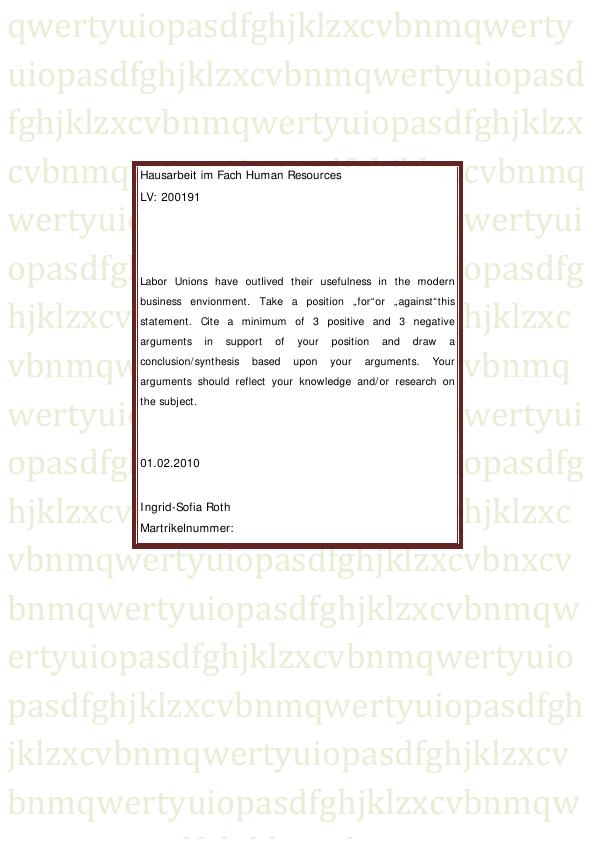„Unionized power is organizational power, which is based on the number of members. The number of members has a demand on the legit representation of the working population. Preservation and extension of this power are orientated on the interest of every labor union. “ Labor Unions in Germany are documenting an ever declining number of members. Although, Labor Unions are performing the „most considerable form of organized interest on the labor market“ Labor unions are more and more endangered by the decreasing number of members and recruiting deficit. Some experts even believe that labor unions will not exist anymore in the future.
One question, of course is, if labor unions really have outlived their usefulness in the modern business work environment. Remembering headlines in newspapers like: „New Year – new resistance“ or "The protest will continue“ I think that labor unions are still important. Especially in the modern business work environment where the competition in different sectors is very fierce and where management tries to safe costs, and working power, in order to increase the company’s profits.
This thesis was written to demonstrate that Labor Unions are still important in our modern business work environment. Therefore the following act was chosen: To get an insight how Labor Unions in Germany were established, the part “History of Labor Unions in Germany” gives a first insight. Afterwards the role of Labor Unions in Germany will be investigated and then a comparison from different countries. In the main part the arguments that Labor Unions have not outlived their usefulness in the modern business working environment and the arguments that Labor Unions have outlived their usefulness in the modern business working environment will be shown. Last but not least my personal opinion about this topic will be shown in the last part “Conclusion”. But first of all I would like to explain what Labor Unions are.
Inhaltsverzeichnis (Table of Contents)
- Introduction
- What are Labor Unions?
- History of Labor Unions in Germany
- The role of Labor Unions in Germany
- International comparison
- Arguments that Labor Unions have not outlived their usefulness in the modern business working environment
- Higher standard of living
- Labor Unions grant benefits in certain business branches
- Better healthcare
- Labor Unions offer the bargaining power.
- Labor Unions guarantee more security
- Arguments that Labor Unions have outlived their usefulness in the modern business working environment
- Labor Unions need too much support.
- Costs of Labor Unions
- Support and services for employees
- Labor Unions use a wrong policy
- Conclusion
- Bibliography
- Internet Sources
Zielsetzung und Themenschwerpunkte (Objectives and Key Themes)
This thesis aims to explore the relevance of labor unions in the contemporary business environment by examining their history, role, and arguments for and against their continued usefulness. The analysis focuses on the German context, but also considers international comparisons.
- The historical development of labor unions in Germany
- The current role and function of labor unions in the German labor market
- The impact of labor unions on the standard of living and working conditions of employees
- The potential benefits and drawbacks of labor unions in the modern business environment
- The future outlook for labor unions in Germany and beyond
Zusammenfassung der Kapitel (Chapter Summaries)
- Introduction: The introduction sets the stage for the thesis by outlining the declining membership numbers of labor unions in Germany and posing the question of their relevance in the modern business environment. The author also states the objective of the thesis, which is to demonstrate the importance of labor unions in the modern business work environment.
- What are Labor Unions?: This chapter provides a definition of labor unions, outlining their purpose and ideology. It also highlights the structure of the German labor movement, particularly the Deutscher Gewerkschaftsbund (DGB).
- History of Labor Unions in Germany: This chapter explores the historical development of labor unions in Germany, tracing their origins to the 19th century and the industrial revolution. It discusses the struggles faced by workers and the role of labor unions in advocating for improved working conditions.
- The role of Labor Unions in Germany: This chapter examines the current role of labor unions in Germany, focusing on their traditional tasks of collective bargaining and codetermination, as well as their wider aims of influencing social legislation and improving working conditions.
- International comparison: This chapter provides a comparative perspective by examining the role of labor unions in other countries, highlighting potential similarities and differences.
- Arguments that Labor Unions have not outlived their usefulness in the modern business working environment: This chapter presents a series of arguments in support of the continued relevance of labor unions, including their contributions to higher standards of living, benefits in specific business branches, improved healthcare, bargaining power, and job security.
- Arguments that Labor Unions have outlived their usefulness in the modern business working environment: This chapter presents arguments against the relevance of labor unions, focusing on their high costs, potential for bureaucracy, and their perceived outmoded policies.
Schlüsselwörter (Keywords)
This thesis focuses on labor unions, their role in the German business environment, and the arguments for and against their continued relevance. Key terms include labor unions, collective bargaining, codetermination, working conditions, social legislation, standard of living, and the German labor movement. The analysis also touches upon international comparisons, exploring the role of labor unions in different countries and their impact on the global economy.
- Quote paper
- Ingrid-Sofia Roth (Author), 2010, Have Labor Unions outlived their usefulness in the modern business working environment?, Munich, GRIN Verlag, https://www.grin.com/document/158491




